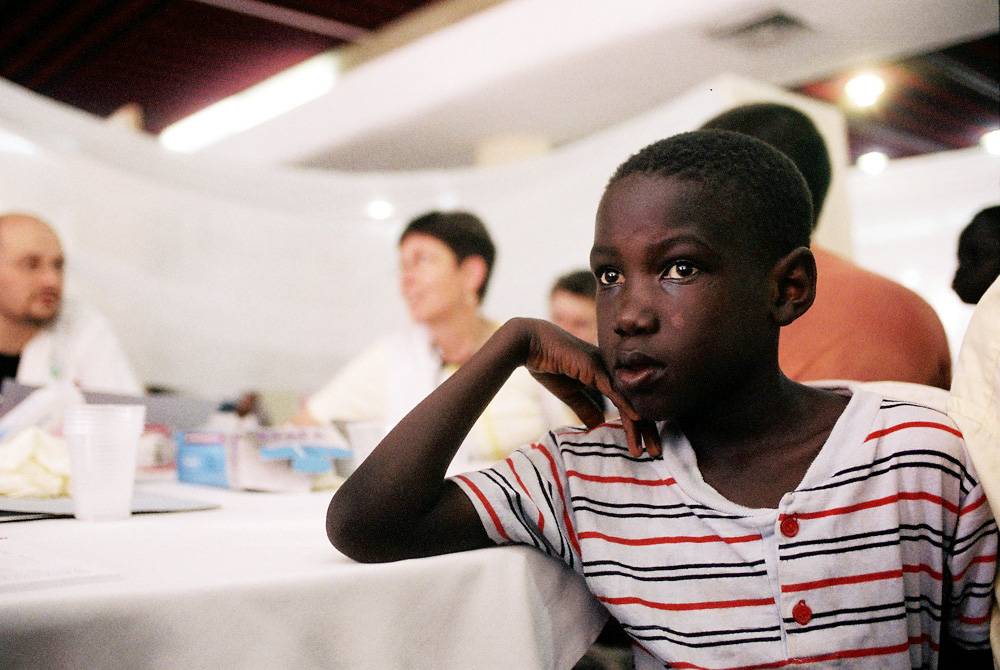According to the new plan, announced on 1 July, Israel will return to Egypt "infiltrators" crossing the countries' joint border. A government communiqué said they would be "quickly" deported and indicated they would not be able to make an asylum claim in Israel.
[See slideshow]
Accordingly, the Israeli security forces have been instructed to arrest and send back all those crossing the border, and to detain those who cannot be immediately returned.
The plan, which Israel formulated together with Egypt, has sparked concern among Israelis aiding African refugees, the majority of whom are from Sudan.
In the past few months some 1,400 refugees have crossed the border into Israel. About 1,000 are Sudanese, including 200 from Darfur.
"These people should not be returned to Egypt unless we receive guarantees that they will be treated properly and according to the refugee convention," said Anat Ben Dor, the head of a legal aid clinic for refugees at Tel Aviv University.
| More on Sudanese refugees in Israel |
Darfur refugees
Regarding the Darfur refugees, it is unclear what will happen with them. A recent Prime Minister's Office communiqué said: "The possibility will be considered of assisting a small portion of the refugees from Darfur who are in Israel only after the full blocking of infiltrations is assured."
Israel is currently developing its immigration policy in response to new migratory pressures.
Asylum seekers in Israel to be affected
Implementation of the decision, which will affect hundreds of asylum seekers already in Israel, including those from war-torn regions such as the Democratic Republic of Congo, the Horn of Africa, Côte d'Ivoire and, of course, Sudan, will be conducted together with the UN Refugee Agency (UNHCR) which will register the refugees.
Miki Bavli, a former Israeli diplomat and now the head of UNHCR in Tel Aviv, said the move is justified.
"You cannot 'shop' for asylum," Bavli explained. "Asylum is given at the first country the refugee enters. This is not about seeking the most comfortable state."
A rights group called the Hotline for Migrant Workers, however, contended that Egypt had a "record of returning refugees to their countries of origin, where they then died". Amnesty International’s Israel section, meanwhile, expressed concern that Israel would "expel everyone in one sweeping move" and not examine "each refugee claim carefully".
"Life is impossible for Sudanese like me in Cairo"
On 29 June a group of about 200 asylum seekers, mostly from southern Sudan, gathered in the basement of a hotel in the southern Israeli city of Beersheba, which has become a city of refuge for many crossing the Egypt-Israel border.
A group of volunteer doctors from Physicians for Human Rights - Israel, a local charity, had arrived to dispense care and medicines to those in attendance.
"We are not asking for anything, just our basic refugee rights, and maybe a little help from the state," said Nader, who added that she was originally from Juba and who arrived in Israel a few days earlier after being smuggled over the border. His seven-month-old daughter, asleep on his shoulder, had just been seen by a doctor.
Another refugee said she fled Egypt after being mistreated there.
 Photo: Shabtai Gold/IRIN  |
| A doctor from Physicians for Human Rights examines a Sudanese baby who recently crossed the border into Israel |
Her husband, Sulaiman, said he could not find any work in Cairo, except unskilled manual labour, which did not earn him enough to raise his children.
"I want to give my children a future, there's nothing for us there," Nadin said.
Namok, a woman in her 50s with six children, who had also just crossed the border, was examined by a doctor and referred to a nearby hospital for further tests. She was having trouble breathing and medical staff were concerned she may have tuberculosis. The Health Ministry has said “infectious diseases” are prevalent among the refugee community.
"I can't remember the last time I saw a doctor," Namok said, breathing heavily and clutching her chest. "It was a long time ago."
The medical team noted that quite of a few of the asylum seekers had been neglected, and had not received proper medical attention for problems such as scabies, fractures and other ailments.
td/shg/ar/cb
This article was produced by IRIN News while it was part of the United Nations Office for the Coordination of Humanitarian Affairs. Please send queries on copyright or liability to the UN. For more information: https://shop.un.org/rights-permissions





